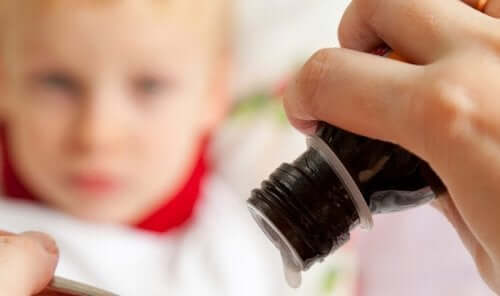11 Home Remedies for a Cough


Written and verified by the nutritionist Saúl Sánchez Arias
Taking into account that coughing is one of the main conditions associated with flu, which is quite common in children, today we’ll present some home remedies for a cough.
Any one of them can help you in your desperation to find an effective solution to counteract this difficult situation every time it presents itself.
The best remedies for children’s coughs
Keep in mind that in addition to the following remedies, if a cough is very bad, you may need drug treatment.
1. Honey from bees
If your child likes honey, you can give him a tablespoon when the cough appears. It’s been proven to be an effective treatment. Other alternatives are:
- Honey with lemon: Mix the same amount of honey with fresh-squeezed lemon juice.
- Oregano and honey infusion: Add two tablespoons of honey to half a cup of oregano infusion while it’s warm. Give it to your child to drink when the cough starts.
- Infusion of thyme, honey, and lemon juice: Give the remedy while it’s warm. Serve half a cup of infusion and then add the juice of half a lemon and two tablespoons of honey.

- Honey chocolate drink: Pour a cup of water, add a tablespoon of dark chocolate, and wait for a few minutes to boil. Remove the drink from the heat, allow it to cool, and strain it. Then add two tablespoons of honey and give it to your child while it’s warm.
- Honey, onion, and lemon syrup: to prepare this infusion, chop a large onion and mash it well. It’s essential that it’s completely crushed so that it releases its juices well. Subsequently, strain it and add the same amount that you’ve obtained of honey and lemon juice; Give a tablespoon of this syrup to your child when they have a cough.
It is an open secret that pediatric cough can worsen at night. Also, it is known that a spoonful of honey before sleeping can be useful to alleviate its intensity. Honey should not be used in children under 1 year of age due to the risk of botulism, and in case of using it at night, brushing the teeth it’s necessary to avoid cavities.
2. Warm cloths
When your child starts coughing, heat a cloth with the iron and put them on their chest. As it cools, replace it with a hot one.
3. Menthol vapor
Put a pan of water on the stove. When it starts to boil, add a few servings of menthol and remove the container from the heat. Before it loses its aroma, bring your child closer to breathe in the steam it gives off.
If you’re going to put a cloth over your child’s head to take better advantage of the vaporization, put the towel over your own head as well. Water vapor can burn you, and this is the only way you’ll be able to check how hot it is. Also, never do this while the over burner is turned on.
4. Menthol on the soles of the feet
Smear menthol on the soles of your little one’s feet and cover them with socks and shoes so they won’t touch them. Their persistent cough will ease up right away.
At the same time, recent studies have shown that putting menthol on the chest and neck in children before bed is beneficial. The use of compounds containing menthol, camphor, and eucalyptus decreases the frequency and intensity of night coughs. In turn, it also improves nasal congestion and quality of sleep.
“Honey can be combined with lemon juice, thyme, or oregano infusions to create home remedies for a cough”
5. Onion
Cut an onion into portions, put them in a sock of your child and tie a knot at the end so that it doesn’t come out. At bedtime, hang the sock on the head of their crib or bed so that they can breathe in that smell and reduce their cough. According to a study published in the journal Respiratory Medicine Case Reports, onion is a useful remedy for treating coughs, especially those caused by infections with microorganisms.
We recommend a small sock so that, if by any chance they get a hold of it, it won’t be easy for them to remove the onion portions.

6. Eucalyptus vapor
Boil eucalyptus branches. When the water comes to a boil, remove the container from the heat and bring your child to the steam that they can smell it. Be careful with hot water.
7. Give your child water to drink
Offer them water; If the child doesn’t mind, add a few drops of lemon juice as well.
8. Avoid antihistamines if the cough is due to a cold
If your child has a dry cough, as it’s commonly known, caused by an allergy, you can medicate them with the antihistamine that they’re used to and that you know that suits them well.
However, if the cough is a consequence of a cold or the flu, avoid giving this type of medicine and opt for home remedies instead. Antihistamines can make the phlegm from a cold thicker. This, in the long run, can extend the illnesses associated with your cold or the spread of the flu virus.
9. Ginger
Ginger is a root that’s been used for many years in natural medicine. It has antiviral, anti-inflammatory, antioxidant, and antifibrotic properties. In fact, studies have shown that all these properties could be useful in the treatment of COVID-19.
To take advantage of the properties of ginger, you only need to make tea with the root. You should take 20 or 40 grams of sliced ginger and add it to a cup of hot water. Then, you must wait for it to cool and give it to your child. You can add a teaspoon of honey to sweeten and enhance the effect if you desire.
10. Marshmallow root
Marshmallow root or Althaea officinalis is a plant widely used in cough syrups. Multiple investigations show the efficacy of this plant in the treatment of dry cough in monotherapy. The mechanisms that explain its effectiveness are very diverse, although it’s believed that it contains mucilage that covers the throat, relieving itching and discomfort.
The tea from this plant will allow you to take advantage of its properties as one of the most effective home remedies for coughs. You just have to get the dried herb or prepared tea bags, add them to a cup of hot water, and give it to your child. It’s possible to ingest the drink hot or cold, as well as with a tablespoon of honey.
11. Thyme
One of the species most used in cooking and in the treatment of multiple conditions is thyme. A systematic review of multiple digital repertoires demonstrated the efficacy of thyme in reducing the intensity and frequency of cough. The large amount of antioxidants in the herb may explain the effect.
Ideally, you should look for a cough syrup that contains thyme to take advantage of its properties. You can also prepare a tea with 2 tablespoons of thyme and a cup of hot water. Just remember to strain the tea before giving it to your child.
Measures to prevent cough
We shouldn’t focus only on curing the child when they have a cough. As always, prevention is also a key point here, even when your little one’s already sick.
Therefore, whatever the reason for the cough, keep your child warm, especially if it’s been raining or cold. Don’t let them play with water. In any case, take them to the bathroom and shower them with lukewarm water while they’re distracted so that their cough will improve. Also, avoid candy and invite them to play passive games so that they don’t get upset and start coughing.
As you may have noticed, the alternatives of home remedies for a cough are numerous. The best thing is that there are options for all tastes, as we know that not all children are the same, nor are their bodies. Don’t wait to try which one works for you!
Taking into account that coughing is one of the main conditions associated with flu, which is quite common in children, today we’ll present some home remedies for a cough.
Any one of them can help you in your desperation to find an effective solution to counteract this difficult situation every time it presents itself.
The best remedies for children’s coughs
Keep in mind that in addition to the following remedies, if a cough is very bad, you may need drug treatment.
1. Honey from bees
If your child likes honey, you can give him a tablespoon when the cough appears. It’s been proven to be an effective treatment. Other alternatives are:
- Honey with lemon: Mix the same amount of honey with fresh-squeezed lemon juice.
- Oregano and honey infusion: Add two tablespoons of honey to half a cup of oregano infusion while it’s warm. Give it to your child to drink when the cough starts.
- Infusion of thyme, honey, and lemon juice: Give the remedy while it’s warm. Serve half a cup of infusion and then add the juice of half a lemon and two tablespoons of honey.

- Honey chocolate drink: Pour a cup of water, add a tablespoon of dark chocolate, and wait for a few minutes to boil. Remove the drink from the heat, allow it to cool, and strain it. Then add two tablespoons of honey and give it to your child while it’s warm.
- Honey, onion, and lemon syrup: to prepare this infusion, chop a large onion and mash it well. It’s essential that it’s completely crushed so that it releases its juices well. Subsequently, strain it and add the same amount that you’ve obtained of honey and lemon juice; Give a tablespoon of this syrup to your child when they have a cough.
It is an open secret that pediatric cough can worsen at night. Also, it is known that a spoonful of honey before sleeping can be useful to alleviate its intensity. Honey should not be used in children under 1 year of age due to the risk of botulism, and in case of using it at night, brushing the teeth it’s necessary to avoid cavities.
2. Warm cloths
When your child starts coughing, heat a cloth with the iron and put them on their chest. As it cools, replace it with a hot one.
3. Menthol vapor
Put a pan of water on the stove. When it starts to boil, add a few servings of menthol and remove the container from the heat. Before it loses its aroma, bring your child closer to breathe in the steam it gives off.
If you’re going to put a cloth over your child’s head to take better advantage of the vaporization, put the towel over your own head as well. Water vapor can burn you, and this is the only way you’ll be able to check how hot it is. Also, never do this while the over burner is turned on.
4. Menthol on the soles of the feet
Smear menthol on the soles of your little one’s feet and cover them with socks and shoes so they won’t touch them. Their persistent cough will ease up right away.
At the same time, recent studies have shown that putting menthol on the chest and neck in children before bed is beneficial. The use of compounds containing menthol, camphor, and eucalyptus decreases the frequency and intensity of night coughs. In turn, it also improves nasal congestion and quality of sleep.
“Honey can be combined with lemon juice, thyme, or oregano infusions to create home remedies for a cough”
5. Onion
Cut an onion into portions, put them in a sock of your child and tie a knot at the end so that it doesn’t come out. At bedtime, hang the sock on the head of their crib or bed so that they can breathe in that smell and reduce their cough. According to a study published in the journal Respiratory Medicine Case Reports, onion is a useful remedy for treating coughs, especially those caused by infections with microorganisms.
We recommend a small sock so that, if by any chance they get a hold of it, it won’t be easy for them to remove the onion portions.

6. Eucalyptus vapor
Boil eucalyptus branches. When the water comes to a boil, remove the container from the heat and bring your child to the steam that they can smell it. Be careful with hot water.
7. Give your child water to drink
Offer them water; If the child doesn’t mind, add a few drops of lemon juice as well.
8. Avoid antihistamines if the cough is due to a cold
If your child has a dry cough, as it’s commonly known, caused by an allergy, you can medicate them with the antihistamine that they’re used to and that you know that suits them well.
However, if the cough is a consequence of a cold or the flu, avoid giving this type of medicine and opt for home remedies instead. Antihistamines can make the phlegm from a cold thicker. This, in the long run, can extend the illnesses associated with your cold or the spread of the flu virus.
9. Ginger
Ginger is a root that’s been used for many years in natural medicine. It has antiviral, anti-inflammatory, antioxidant, and antifibrotic properties. In fact, studies have shown that all these properties could be useful in the treatment of COVID-19.
To take advantage of the properties of ginger, you only need to make tea with the root. You should take 20 or 40 grams of sliced ginger and add it to a cup of hot water. Then, you must wait for it to cool and give it to your child. You can add a teaspoon of honey to sweeten and enhance the effect if you desire.
10. Marshmallow root
Marshmallow root or Althaea officinalis is a plant widely used in cough syrups. Multiple investigations show the efficacy of this plant in the treatment of dry cough in monotherapy. The mechanisms that explain its effectiveness are very diverse, although it’s believed that it contains mucilage that covers the throat, relieving itching and discomfort.
The tea from this plant will allow you to take advantage of its properties as one of the most effective home remedies for coughs. You just have to get the dried herb or prepared tea bags, add them to a cup of hot water, and give it to your child. It’s possible to ingest the drink hot or cold, as well as with a tablespoon of honey.
11. Thyme
One of the species most used in cooking and in the treatment of multiple conditions is thyme. A systematic review of multiple digital repertoires demonstrated the efficacy of thyme in reducing the intensity and frequency of cough. The large amount of antioxidants in the herb may explain the effect.
Ideally, you should look for a cough syrup that contains thyme to take advantage of its properties. You can also prepare a tea with 2 tablespoons of thyme and a cup of hot water. Just remember to strain the tea before giving it to your child.
Measures to prevent cough
We shouldn’t focus only on curing the child when they have a cough. As always, prevention is also a key point here, even when your little one’s already sick.
Therefore, whatever the reason for the cough, keep your child warm, especially if it’s been raining or cold. Don’t let them play with water. In any case, take them to the bathroom and shower them with lukewarm water while they’re distracted so that their cough will improve. Also, avoid candy and invite them to play passive games so that they don’t get upset and start coughing.
As you may have noticed, the alternatives of home remedies for a cough are numerous. The best thing is that there are options for all tastes, as we know that not all children are the same, nor are their bodies. Don’t wait to try which one works for you!
All cited sources were thoroughly reviewed by our team to ensure their quality, reliability, currency, and validity. The bibliography of this article was considered reliable and of academic or scientific accuracy.
- Ashkin E, Mounsey A. PURLs: a spoonful of honey helps a coughing child sleep. J Fam Pract. 2013 Mar;62(3):145-7.
- Beigoli S, Behrouz S, Memar Zia A, Ghasemi SZ, Boskabady M, Marefati N, Kianian F, Khazdair MR, El-Seedi H, Boskabady MH. Effects of Allium cepa and Its Constituents on Respiratory and Allergic Disorders: A Comprehensive Review of Experimental and Clinical Evidence. Evid Based Complement Alternat Med. 2021 Sep 11;2021:5554259.
- Dorsch W, Ring J. Anti-inflammatory substances from onions could be an option for treatment of COVID-19-a hypothesis. Allergo J Int. 2020;29(8):284-285.
- Guppy MP, Mickan SM, Del Mar CB. “Drink plenty of fluids”: a systematic review of evidence for this recommendation in acute respiratory infections. BMJ. 2004 Feb 28;328(7438):499-500.
- Horváth G, Ács K. Essential oils in the treatment of respiratory tract diseases highlighting their role in bacterial infections and their anti-inflammatory action: a review. Flavour Fragr J. 2015 Sep;30(5):331-341.
- Lam SHF, Homme J, Avarello J, Heins A, Pauze D, Mace S, Dietrich A, Stoner M, Chumpitazi CE, Saidinejad M. Use of antitussive medications in acute cough in young children. J Am Coll Emerg Physicians Open. 2021 Jun 18;2(3):e12467.
- Paul IM, Beiler JS, King TS, Clapp ER, Vallati J, Berlin CM Jr. Vapor rub, petrolatum, and no treatment for children with nocturnal cough and cold symptoms. Pediatrics. 2010 Dec;126(6):1092-9.
- Townsend EA, Siviski ME, Zhang Y, Xu C, Hoonjan B, Emala CW. Effects of ginger and its constituents on airway smooth muscle relaxation and calcium regulation. Am J Respir Cell Mol Biol. 2013 Feb;48(2):157-63.
- Wise PM, Breslin PA, Dalton P. Sweet taste and menthol increase cough reflex thresholds. Pulm Pharmacol Ther. 2012 Jun;25(3):236-41.
- Worrall G. Acute cough in children. Can Fam Physician. 2011 Mar;57(3):315–8.
This text is provided for informational purposes only and does not replace consultation with a professional. If in doubt, consult your specialist.








